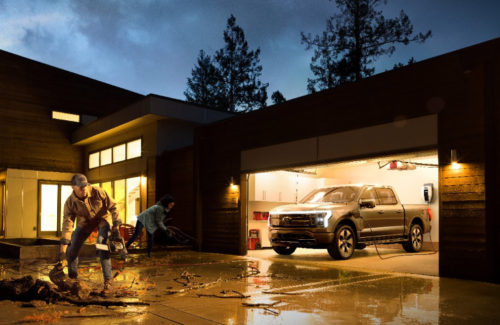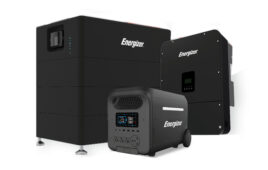The Ford Motor Company has chosen Sunrun to serve as the preferred installer of the home charging system for the new all-electric F-150 Lightning truck. The electric truck can serve as a stand-alone battery system in emergencies via its “Ford Intelligent Backup Power” option. Yes — the F-150 Lightning can serve as a home backup energy source during a power outage event, providing 9.6 kW of power.
 The backup power is enabled by the 80-amp Ford Charge Station Pro and home integration system that will be installed by Sunrun dealers.
The backup power is enabled by the 80-amp Ford Charge Station Pro and home integration system that will be installed by Sunrun dealers.
“Whether sheltering during a storm or trying to stay safe in a heat wave, customers can now use their truck to give themselves power when they need it most,” said Ryan O’Gorman, electric vehicle manager, strategic partnerships, Ford. “F-150 Lightning is built for seamless transitions between charging your vehicle and powering your house when needed – and Ford is the first in the U.S. to offer this capability on an electric truck.”
Through the Sunrun/Ford partnerships, customers will be provided the opportunity to install a solar + storage system on their home.
“Ford is a trusted brand that’s been at the forefront of American innovation for over 100 years, and it is exciting to see them electrifying their most popular truck in company history,” said Lynn Jurich, Sunrun CEO and Co-Founder. “We’re at the beginning stages of a partnership that can bring energy resilience to millions of Americans across the country.”
In the future, Ford said it will introduce Ford Intelligent Power, which would allow the electric truck to power homes during high-cost, peak-energy hours.
Reservations for the F-150 Lightning are open now at ford.com, and deliveries will begin in mid-2022. Sunrun will then provide customers with installation services and access to solar + storage systems.





Ford is keeping their dealers and, in turn, their customers on the dark regarding the 80A 9.6kW Ford Charging Station Pro. Probably in hopes that customers will be caught off guard at the requirements and capitulate to having Sunrun work their salescraft on them.
No thanks.
I’m having a local electrician install the necessary infrastructure in my house and just buying the charger from Ford. I’ll pass on a national outfit sending someone to monkey with my house or try to upsell me on solar (I live in trees, kinda pointless anyway). This information blackout strategy is borderline irritating.
The truck with the extended range battery comes with the charger!
The emergency power from the truck to the house will require a transfer switch to isolate the truck and house from the grid, just like automatic permanently installed generator do. The system can not backfeed into the grid if the grid is down, this could injure utility workers working on the grid.
So far I have found nothing available, like an installation manual to explain the parts and connection strategy for the 80amp charging station. Also the 80amp charger will be required to have a 100amp circuit for the charger. Solar guys will think of the 120% rule in the NEC and think, supply side tap, but we still need to isolate from the grid for the standby power.
Sun Commercial Solar.
I OWN NISSAN LEAF CAR THAT IS FULLY ELECTRIC WITH 24kWH LITHIUM BATTERY.. HOW CAN I USE THIS BATTERY TO POWER MY HOME DURING POWER OUTAGE. I NEED A SIMPLE AND WORKABLE SOLUTION, WHERE, I CAN PLUG THE 12V CIGARETTE LIGHTER OUTLET TO DRAW THE POWER TO POWER MY HOME APPLIANCES DURING POWER OUTAGE. THE DEVICE SHOULD NOT COST MORE THAN $200.00.
Ford has a good idea on this EV. Question, can this vehicle be charged while sitting outdoors in the driveway ?
At $39,000 less rebates and the proceeds from selling my 4 year old f-150 ICE work truck I could get a new EV truck for about 10k. That’s the price of a smaller home backup battery system alone. Why am I not signing up? Two reasons. First, the integrated system needs to be smart enough to be grid aware to reduce peak rates, respond to requests to limit grid draw from a service like Ohm Connect to generate income and charge the truck when the grid is down. Second, I MUST have a full size bed and only a front seat. The current offering is only a 4 door and 6′ bed. They may have opted to produce the most popular model sold or…… the EV in a work truck model may be cheaper than the comparable ICE version after rebates and they don’t want to cut into sales margins.
you are not a truck person…stay away
What I’m unsure of is if the truck can accept a charge from solar panels during an outage. Where I’m at in California, 5 day power safety shut offs due to wildfire concerns are becoming the norm. If i can top it off during the day with solar, then I’m a buyer.
Hey Tom. I am pretty sure the chargers will run off house power (120 AC), so if your solar panels are powering the house, they will also charge your truck. These are early days, and I think a lot will fall into place over the next 8 months. I would like it if I could use my little 4KW emergency generator to charge it. Probably could do that if I plugged the small charger into the generator. All I would need then is gasoline for the generator. Not ideal, but if I had a prolonged outage, it would be nice to be able to run the whole house off a 4KW generator.
Come to think of it, that last idea would probably not work, because I could not plug the truck into the charger and the house at the same time.
It’s great to see Ford heading in the alternative energy direction especially with the Mustang Mach-e and the new Ford F150 lightning.
The big thing is stated in this quote… “In the future, Ford said it will introduce “Ford Intelligent Power”, which would allow the electric truck to power homes during high-cost, peak-energy hours. That is one of a kind technology especially from the automotive world.
The Ford “launch” announcement yesterday, did mention the 9.6kW inverter built into the Ford Lightning, I believe it is the same inverter the Ford F-150 hybrid is using now. So, Ford doesn’t seem to have a problem with V2H connectivity for emergency use and the announcement here that in the future, Ford Intelligent power management may also use the truck for high demand charge and TOU rate times of the day.
TESLA early on had this vision of solar PV and energy storage for each home, (then) a charging connection for a BEV, the vehicle to house proposal was not made. Ford will be the first and it seems will prove or disprove the theory that using the vehicle battery pack to power the home in emergencies will degrade the vehicle pack and it will degrade and not make a 10 year in use battery pack warranty period. After this February in Texas, there might be a lot of folks that would be okay if they had to replace a battery pack in 7 years from emergency use.
Great point on the battery degradation. If Ford honors its warranty in such cases, this could prove to be a drain on Ford’s P&L.
Also of concern is the readiness of the vehicle battery after discharging during peak rate periods for TOU billing customers. The vehicle will have diminished range. Even more so during a power outage.
I can see a mother telling her children to turn off the TVs in order to preserve enough charge to drive to the grocery store.
On the other hand, I also envision employers offering free charging to their employees in exchange for the vehicle’s availability to reduce peak demand charges, which would require a fleet of connected vehicles, but operation for shorter durations of time. But fleet vehicles wouldn’t be the F150. Hopefully this is expanded to other vehicle models where these dynamics could be utilized by vehicle fleet operators.
I don’t powering your home being a problem at all and I honestly don’t understand it. My car uses around 20kw when cruising down the highway non stop, how is draining 9kw to power the home any worse than when I’m driving down the road? Especially since most people are only doing to do it in an emergency so maybe once a year or so.
I see your point and the difference is the inverter in your car driving the motor is programmed to handle that load and (duty cycle). Regenerative braking is one such value adder. Homes on the other hand may have unbalanced circuits, pumps that draw high surge current that would max out the 9kW inverter of the vehicle. What the utilities know that is not advertised. About 9 years ago a convention of electric utility types came together and the consensus was that the alternative energy market was going to cut into their territory and the services provided will shrink to constrict revenues flow and create O&M, funding cuts. Two cases in point, California and the invocation of the PSPS and Texas and its unwillingness to forgo some dividends for infrastructure hardening. This is continuing and will only get worse as more States, and towns create their own energy mandates and town ordinances. As for solar PV and energy storage, the cost is coming down for the technology and the residential adopter is becoming more prevalent. Having a truck that could take care of a chunk of your house loads during a power outage is just another “adder” to individual energy responsibility. A new day has dawned, there are still many out there that don’t understand how bad it could get before technology, legislation and business models change to become inclusive partners in energy generation, storage and use every day.